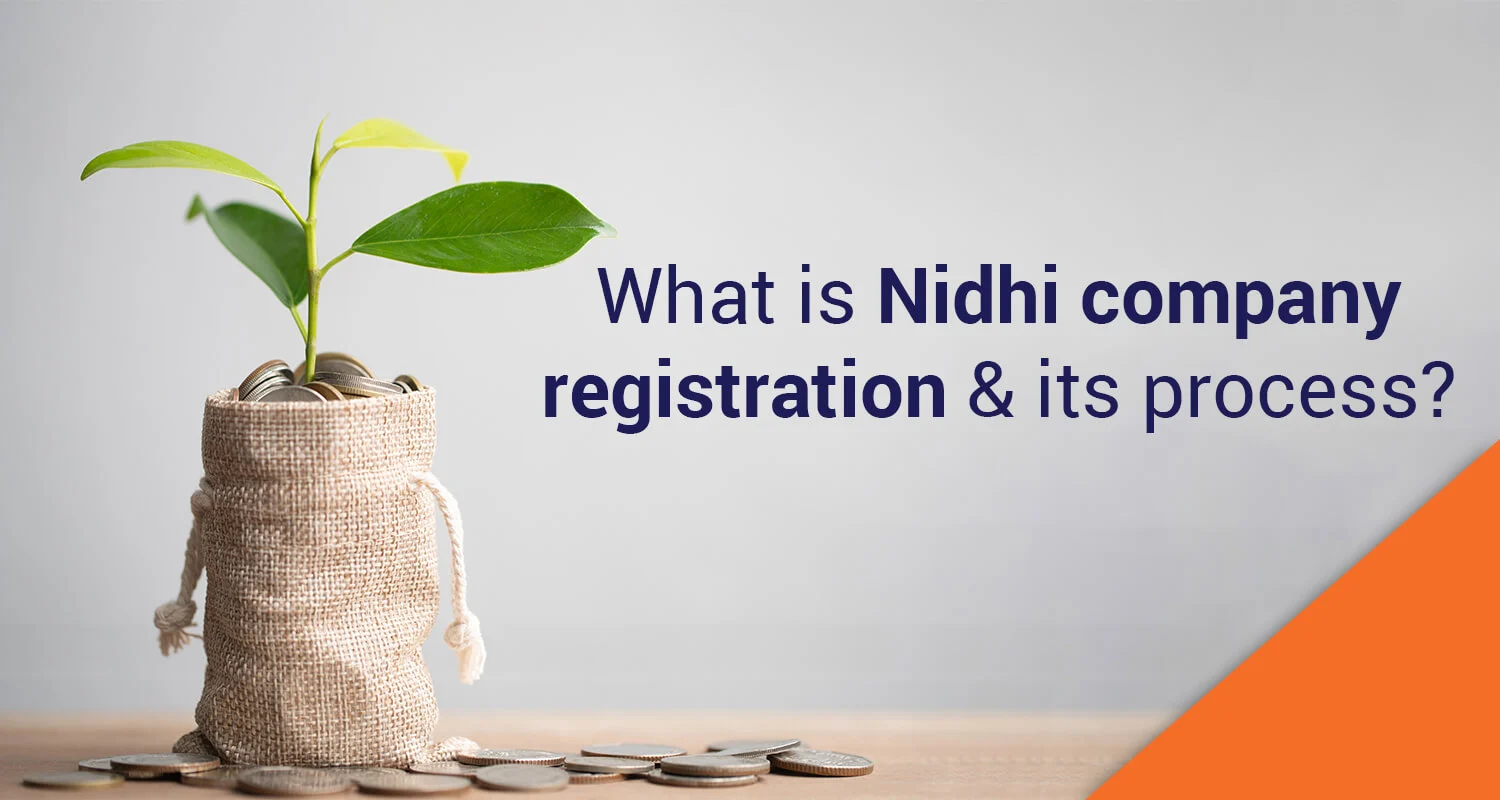What is Nidhi Company Registration & Its Process
Table of Contents
What is Nidhi Company?
A Nidhi Company is a unique NBFC regulated under the Companies Act, 2013, and the Nidhi Rules, 2014. Nidhi company signifies that these companies promote thrift and savings habits among their members by accepting deposits and providing loans. They primarily cater to their local communities and operate within a defined geographical area.Requirements for Obtaining Nidhi Company Status:
Within One Year of Registration:
- Minimum Membership: A Nidhi company must have at least 200 members within one year of starting operations.
- Financial Strength: The company's net owned funds (equity share capital + free reserves - accumulated losses - intangible assets) must be ₹10 lakh or more.
- Deposit Security: Unencumbered term deposits (deposits not pledged as security) must be at least 10% of the total outstanding deposits.
- Healthy Debt Ratio: The ratio of net owned funds to deposits should not exceed 1:20. This ensures the company has sufficient capital to back its deposit liabilities.
Compliance Filing:
If a Nidhi company meets all the above conditions within the first year, it must file form NDH-1 along with the prescribed fees within 90 days from the end of that financial year. The form needs to be certified by a practicing Chartered Accountant (CA), Company Secretary (CS), or Cost and Works Accountant (CWA).Extension Option:
Companies that are unable to meet the requirements within the first year can apply for an extension of one additional financial year. To do so, they need to submit form NDH-2 to the Regional Director within 30 days from the end of the first financial year.Strict Enforcement:
If a Nidhi company fails to meet the requirements even after the second financial year, it will be prohibited from accepting new deposits until it complies with the regulations. Additionally, it may face penalties for non-compliance.Sapna aapka. Business Loan Humara.
Apply NowBenefits of Nidhi Company Registration
Nidhi companies offer several advantages for entrepreneurs:
- Tax benefits: They can enjoy tax exemptions on their profits under certain conditions.
- Reduced regulatory burden: Compared to other NBFCs, Nidhi companies face less stringent regulations.
- Local focus: They cater to the specific financial needs of their communities, fostering local economic development.
- Enhanced credibility: Registration brings legitimacy and builds trust among members.
Eligibility for Nidhi Company Registration
For registration of Nidhi company, the following requirements must be met:
- Minimum members: A minimum of seven members are required at the time of incorporation.
- Minimum capital: The minimum paid-up capital must be Rs. 5 lakh.
- Business restrictions: Nidhi companies cannot undertake activities like issuing debentures or underwriting insurance.
- Profit distribution: They can only distribute a maximum of 20% of their net profit as dividend.
Nidhi Finance Company Registration Process
Registration of Nidhi company involves several steps:
- Director Identification Number (DIN) and Digital Signature Certificate (DSC): All proposed directors must obtain a DIN. Additionally, at least one director needs a DSC for online filing.
- Name Approval: Choose a unique and available company name using the Ministry of Corporate Affairs' (MCA) Reserve Unique Name (RUN) service.
- Memorandum of Association (MoA) and Articles of Association (AoA): Prepare these documents outlining the company's objectives and internal governance rules.
- SPICe+ Form Filing: File the SPICe+ form electronically on the MCA portal. This form integrates various applications for company incorporation, DIN, PAN, and TAN.
- Obtaining PAN and TAN: Apply for a Permanent Account Number (PAN) and Tax Deduction and Collection Account Number (TAN) for the company.
- Commencement of Business Certificate (CBC): Upon successful registration, the MCA will issue a CBC, authorizing the company to commence operations.
Nidhi Company Registration Documents
The following documents are typically required for Nidhi company registration:
- DIN and DSC: Copies of DINs for all proposed directors and the DSC of the director authorized to sign electronically.
- Identity and Address Proof: PAN cards, voter ID cards, passports, or driving licenses of all directors and members.
- Residence Proof: Utility bills, rent agreements, or property ownership documents for the registered office address.
- MoA and AoA: Duly stamped and signed copies of the MoA and AoA.
- Subscription Details: Details of initial share capital subscription by members.
Nidhi Company Registration Fees
The registration fees for a Nidhi company depend on the authorized share capital. The MCA charges a nominal fee for filing the SPICe+ form and obtaining the CBC. Additionally, stamp duty needs to be paid on the MoA based on the authorized share capital.Conclusion
Nidhi company registration offers a unique opportunity for entrepreneurs to cater to the financial needs of their local communities. By understanding the eligibility criteria, registration process, and benefits, you can make an informed decision about establishing a Nidhi company.FAQs
1. What are the ongoing compliance requirements for Nidhi companies?
Ans. Nidhi companies must comply with various regulations, including filing annual returns, maintaining financial records, and conducting audits as applicable.
2. Can a Nidhi company convert into a bank?
Ans. No, Nidhi companies cannot directly convert into banks. However, they can apply for a fresh license from the Reserve Bank of India (RBI) to operate as a bank if they meet the eligibility criteria.
3. Who can register a Nidhi company?
Ans. To register a Nidhi company, you need to meet specific criteria.
- A minimum of seven members are required at the time of incorporation.
- The minimum paid-up capital must be Rs. 5 lakh.
- The company cannot undertake activities like issuing debentures or underwriting insurance.
- Profit distribution is capped at 20% of net profit as dividends.
4. What are the fees associated with Nidhi company registration?
Ans. The registration fees depend on the authorized share capital. The MCA charges a nominal fee for filing and obtaining the CBC. Additionally, stamp duty needs to be paid on the MoA based on the authorized share capital.
Sapna aapka. Business Loan Humara.
Apply NowDisclaimer : The information in this blog is for general purposes only and may change without notice. It does not constitute legal, tax, or financial advice. Readers should seek professional guidance and make decisions at their own discretion. IIFL Finance is not liable for any reliance on this content. Read more




